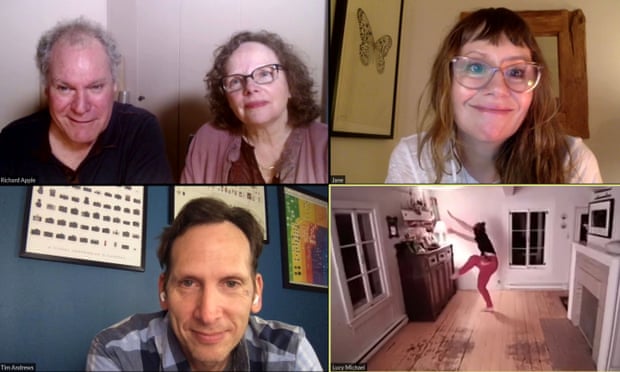Since 2010, audiences have been following the dinnertime conversations of the fictional Apples, an ordinary white middle-class family in upstate New York. The live on-stage performances were a running staple at The Public Theater, and since the coronavirus shutdown, writer and director Richard Nelson’s new “pandemic trilogy” made the move to Zoom – as we’ve all been compelled to do – with What Do We Need To Talk About? (produced by The Public) and And So We Come Forth (presented by Apple Family Productions).

In the latest world-premiere installment, Incidental Moments of the Day, the familiar characters begin with their usual mundane chat (as referenced in the title, derived from the everyday subjects painted by French Post-Impressionist Pierre Bonnard), but the effects of the past six months of COVID-19 quarantine and socio-political upheaval, with no end in sight, have become increasingly clear in their obvious isolation, depression, and anxiety. As they catch up on family matters, come to terms with their present situations, and begin to venture outside for a few brief (masked and socially distanced) encounters, they also question the issues of cancel culture and racism that plague our country (“I don’t think just being white makes me a racist. What do you think?”) – as we’ve all been compelled to do.
And that’s both the value and the trouble with the Apple series. While it’s a realistic and psychologically penetrating real-time view of what’s happening now from the perspective of one traditional white American family revealing what they are feeling, thinking, and experiencing, it’s also a melancholic reiteration of how we’ve had to maintain virtual connections with friends and loved ones and what we see every day on the news, in the streets, and in our lives, with no end (or lasting solutions) in sight. There is reflection, at times becoming tedious, without dramatic arc or resolution.
The recurrent members of the cast – featuring Maryann Plunkett as Barbara Apple, Jay O. Sanders as Richard Apple, Sally Murphy as Jane Apple, and Stephen Kunken as Jane’s boyfriend Tim Andrews, with appearances by Charlotte Bydwell as aspiring dancer/choreographer Lucy Michael (Barbara’s former high-school student, stranded in France on a dance fellowship) and Laila Robins as Marian Apple Platt (sister of siblings Barbara, Richard, and Jane) – are consistently outstanding in their completely natural deliveries of the personalities, concerns, and relatable humanity of the characters. Recorded live from their remote locations, the Zoom-box format presents an intimate close-up of their facial expressions and reactions, which are not always as readily visible from the distance of a stage. We can read them as they watch Lucy perform from her apartment in Angers, Barbara struggle to tell a joke, and Jane finally admit that she’s suffering from depression, among the other personal moments they so convincingly portray, without being “showy or flowery.”
Perhaps the most uplifting leitmotiv of the script is the recognition of the importance of the arts, not only to entertain, but also to shine a spotlight on society and to make us think. Nelson’s resonant references – along with the paintings of Bonnard and Lucy’s lighthearted dance to Scott Joplin’s “Maple Leaf Rag” – include quotes from the Black American author James Baldwin (in his discussion of “the conundrum of color”), white South African playwright Athol Fugard (who observed “the mysteries of the human heart”), and Russian writer Anton Chekhov (in the underlying message of The Cherry Orchard). And despite some obvious cracks in the Apples’ familial relationships (Barbara thinks Richard’s new girlfriend Yvonne talks too much; Tim isn’t sure how to handle Jane’s suggestion about living arrangements for his daughter) – exacerbated by the stress of the times and the realization that “life is complicated” – they continue the conversation.

Running Time: Approximately 75 minutes.
Incidental Moments of the Day – The Apple Family: Life on Zoom by Apple Family Productions is available for eight weeks, through November 5, 2020, on the company’s website, on YouTube, and here, below. Viewing is free, but donations are requested to support the Stage Directors and Choreographers Foundation in the US and the Theatre Artists Fund in the UK.




